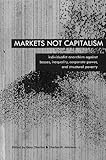No, that conclusion is not what I'm claiming. I'm not saying that capitalism is the same as corporatism; I'm saying that capitalists (people who control the capital, not supporters of capitalism) have an incentive to change a capitalist system to a corporatist system.
Isn't there something fundamentally different which is also called capitalism? Without any reference to who owns the means of production, where mutually voluntaristic exchange occurs in an unhampered market scenario we call this process capitalism as well.
Capitalism necessarily entails ownership of capital; this is not to say that it's the same as corporatism.
There are people who defend markets without defending capitalism: these are usually called mutualists, and they're usually connoted with the left, though unlike state socialists, they defend a stateless society.
I've been reading this on the subject, but I'm still very early on: http://www.amazon.com/Markets-Not-Capitalism-Individualist-I...
Saying "the capitalists" is a lot like the us vs. them tactic of left vs. right or republicans vs. democrats.
That depends on the intention, no? I wasn't judging them, I was stating a fact about the incentives that people who own capital are subject to. This doesn't mean that all capitalists are necessarily promoting corporatism; just that it's in their self-interest to do so.
And again, this is hardly a leftist position, it's (as I said) shared by people like Friedman, and it's one of the arguments in favor of anarcho-capitalism.
What is "an established capitalist"? Is that somehow different than a run of the mill capitalist?
It's what it says. There are established companies and startups, and there are established capitalists and young entrepreneurs trying to compete with them.
If you buy into the outmoded doctrine of profit seeking automatons as "capitalists", then your argument works. Competing theories of the firm have discovered the tendency toward revenue-maximization versus pure, blind monetary profit maximization.
Having state protection against competition helps with both. But again, this is not a judgment of individual capitalists, it's statement about the incentives they have. It doesn't mean they're all bound to lobby, they just have a incentive to do so.
Just because you recognize that utilizing a state's ability to assign perks to business is properly called corporatism as well doesn't mean that you aren't conflating this process of exploitation with genuine free-market capitalism.
My point is that economic systems are not immutable; a free market capitalists system can be replaced by a corporatist system, much like feudalism was replaced by the current system.

